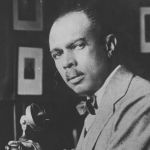I. Le Bonheur
dogwood flakes
what is green
the petals
from the apple
blow on the road
mourning doves
mark the sway
of the afternoon, bees
dig the plum blossoms
the morning
stands up straight, the night
is blue from the full of the April moon
iris and lilac, birds
birds, yellow flowers
white flowers, the Diesel
does not let up dragging
the plow
as the whippoorwill,
the night’s tractor, grinds
his song
and no other birds but us
are as busy (O saisons, O chateaux!
Délires!
What soul
is without fault?
Nobody studies
happiness
Every time the cock crows
I salute him
I have no longer any excuse
for envy. My life
has been given its orders: the seasons
seize
the soul and the body, and make mock
of any dispersed effort. The hour of death
is the only trespass
II. The Charge
dogwood flakes
the green
the petals from the apple-trees
fall for the feet to walk on
the birds are so many they are
loud, in the afternoon
they distract, as so many bees do
suddenly all over the place
that in the morning each thing
is separate but by noon
they have melted into each other
like the full moon and the whippoorwill
and us, are busy. We are busy
if we can get by that whiskered bird,
that nightjar, and get across, the moon
is our conversation, she will say
what soul
isn’t in default?
can you afford not to make
the magical study
which happiness is? do you hear
the cock when he crows? do you know the charge,
that you shall have no envy, that your life
has its orders, that the seasons
seize you too, that no body and soul are one
if they are not wrought
in this retort? that otherwise efforts
are efforts? And that the hour of your flight
will be the hour of your death?
III. Spring
The dogwood
lights up the day.
The April moon
flakes the night.
Birds, suddenly,
are a multitude
The flowers are ravined
by bees, the fruit blossoms
are thrown to the ground, the wind
the rain forces everything. Noise—
even the night is drummed
by whippoorwills, and we get
as busy, we plow, we move,
we break out, we love. The secret
which got lost neither hides
nor reveals itself, it shows forth
tokens. And we rush
to catch up. The body
whips the soul. In its great desire
it demands the elixir
In the roar of spring,
transmutations. Envy
drags herself off. The fault of the body and the soul
—that they are not one—
the matutinal cock clangs
and singleness: we salute you
season of no bungling




















Comment form: